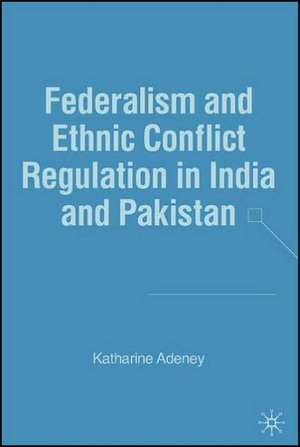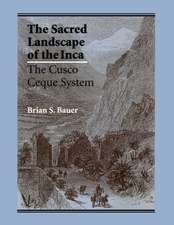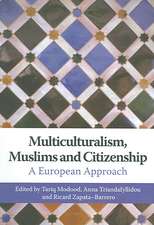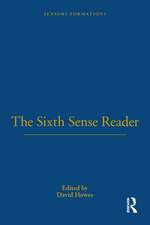Federalism and Ethnic Conflict Regulation in India and Pakistan
Autor K. Adeneyen Limba Engleză Hardback – 5 iun 2007
| Toate formatele și edițiile | Preț | Express |
|---|---|---|
| Paperback (1) | 383.93 lei 6-8 săpt. | |
| Palgrave Macmillan US – 6 iun 2007 | 383.93 lei 6-8 săpt. | |
| Hardback (1) | 387.20 lei 6-8 săpt. | |
| Palgrave Macmillan US – 5 iun 2007 | 387.20 lei 6-8 săpt. |
Preț: 387.20 lei
Nou
Puncte Express: 581
Preț estimativ în valută:
74.10€ • 80.46$ • 62.24£
74.10€ • 80.46$ • 62.24£
Carte tipărită la comandă
Livrare economică 23 aprilie-07 mai
Preluare comenzi: 021 569.72.76
Specificații
ISBN-13: 9781403971869
ISBN-10: 1403971862
Pagini: 238
Ilustrații: XVIII, 239 p.
Dimensiuni: 140 x 216 x 21 mm
Greutate: 0.4 kg
Ediția:2007
Editura: Palgrave Macmillan US
Colecția Palgrave Macmillan
Locul publicării:New York, United States
ISBN-10: 1403971862
Pagini: 238
Ilustrații: XVIII, 239 p.
Dimensiuni: 140 x 216 x 21 mm
Greutate: 0.4 kg
Ediția:2007
Editura: Palgrave Macmillan US
Colecția Palgrave Macmillan
Locul publicării:New York, United States
Cuprins
Comparative Federalism and Ethnic Conflict: A Theoretical Examination * Federal Plans in Pre-independence India * The Federal "Problem" in South Asia: Institutional Design before Partition * Partition: Differences in Federal Design * Federal Segregation or Multiculturalism? * Federal (in)Stability in India * Federal (in)Stability in Pakistan * Future Prospects for India and Pakistan and Lessons for Ethnically Divided Societies
Recenzii
"Katharine Adeney's book sets a new standard in the literature on comparative federalism and South Asian studies...The book's impressive empirical underpinnings will be invaluable in predicting the expected levels of federal stability in India and Pakistan." - Lawrence Saez, Political Studies Review
"This book breaks new ground . . . Adeney's conclusions are particularly instructive to both practitioners and federalism think-tanks currently contemplating the institutionalisation of federalism in states like Sri Lanka, Iraq, Nepal and Afghanistan." - Contemporary South Asia
"Katharine Adeney has written a book of exceptional analytical clarity. Theoretically sophisticated and empirically rich, this study moves beyond the tired clichés that have afflicted much of the comparative scholarship on India and Pakistan. Explaining why federal structures are sometimes able to manage diversity (and sometimes not), Adeney provides an original and historically informed account of institutions as both cause and effect - as a reflection of social realities as well as key determinants of political behavior. This is a book of significance well beyond South Asian studies." - Robert Jenkins, Professor of Political Science, Birkbeck College, University of London
"Katharine Adeney's searching and finely nuanced study argues that federalism and consociationalism take many forms. Their achievement as strategies for dealing with ethnic conflict varies with context. Her historically informed analysis makes an important contribution to our understanding of federalism and consociationalism in general, while the particular cases, India's relative success and Pakistan's relative failure, illuminate the contextual quality of causality." - Susanne Hoeber Rudolph, Professor of Political Science Emerita, University of Chicago
"Katharine Adeney's book deserves an enthusiastic welcome for several reasons. Comparative research on Pakistan and India is a rarity - and it is rarer still to see analyses that are as penetrating and dispassionate as this one. Her discussion of 'ethnic' conflict is extremely valuable because - unlike many that have recently appeared - it breaks 'ethnicity' down into linguistic and religious dimensions. And it also demonstrates that what sometimes appear to be 'ethnic' conflicts are actually rooted in disputes over material issues, such as the control of resources. Finally, this is a major and subtle contribution to the literature on comparative federalism. It is unusual for a book - especially a first book - to enrich our understanding on so many fronts; but that is what this one does." - James Manor, Institute of Development Studies, University of Sussex
"Adeney's astute comparison of India and Pakistan is an important addition to the literature explaining that institutions matter to the democratic health of the countries that adopt them." - Donald L. Horowitz, James B. Duke Professor of Law and Political Science, Duke University
"This book breaks new ground . . . Adeney's conclusions are particularly instructive to both practitioners and federalism think-tanks currently contemplating the institutionalisation of federalism in states like Sri Lanka, Iraq, Nepal and Afghanistan." - Contemporary South Asia
"Katharine Adeney has written a book of exceptional analytical clarity. Theoretically sophisticated and empirically rich, this study moves beyond the tired clichés that have afflicted much of the comparative scholarship on India and Pakistan. Explaining why federal structures are sometimes able to manage diversity (and sometimes not), Adeney provides an original and historically informed account of institutions as both cause and effect - as a reflection of social realities as well as key determinants of political behavior. This is a book of significance well beyond South Asian studies." - Robert Jenkins, Professor of Political Science, Birkbeck College, University of London
"Katharine Adeney's searching and finely nuanced study argues that federalism and consociationalism take many forms. Their achievement as strategies for dealing with ethnic conflict varies with context. Her historically informed analysis makes an important contribution to our understanding of federalism and consociationalism in general, while the particular cases, India's relative success and Pakistan's relative failure, illuminate the contextual quality of causality." - Susanne Hoeber Rudolph, Professor of Political Science Emerita, University of Chicago
"Katharine Adeney's book deserves an enthusiastic welcome for several reasons. Comparative research on Pakistan and India is a rarity - and it is rarer still to see analyses that are as penetrating and dispassionate as this one. Her discussion of 'ethnic' conflict is extremely valuable because - unlike many that have recently appeared - it breaks 'ethnicity' down into linguistic and religious dimensions. And it also demonstrates that what sometimes appear to be 'ethnic' conflicts are actually rooted in disputes over material issues, such as the control of resources. Finally, this is a major and subtle contribution to the literature on comparative federalism. It is unusual for a book - especially a first book - to enrich our understanding on so many fronts; but that is what this one does." - James Manor, Institute of Development Studies, University of Sussex
"Adeney's astute comparison of India and Pakistan is an important addition to the literature explaining that institutions matter to the democratic health of the countries that adopt them." - Donald L. Horowitz, James B. Duke Professor of Law and Political Science, Duke University
Notă biografică
KATHARINE ADENEY is a Senior Lecturer in Politics at the University of Sheffield, UK.
















